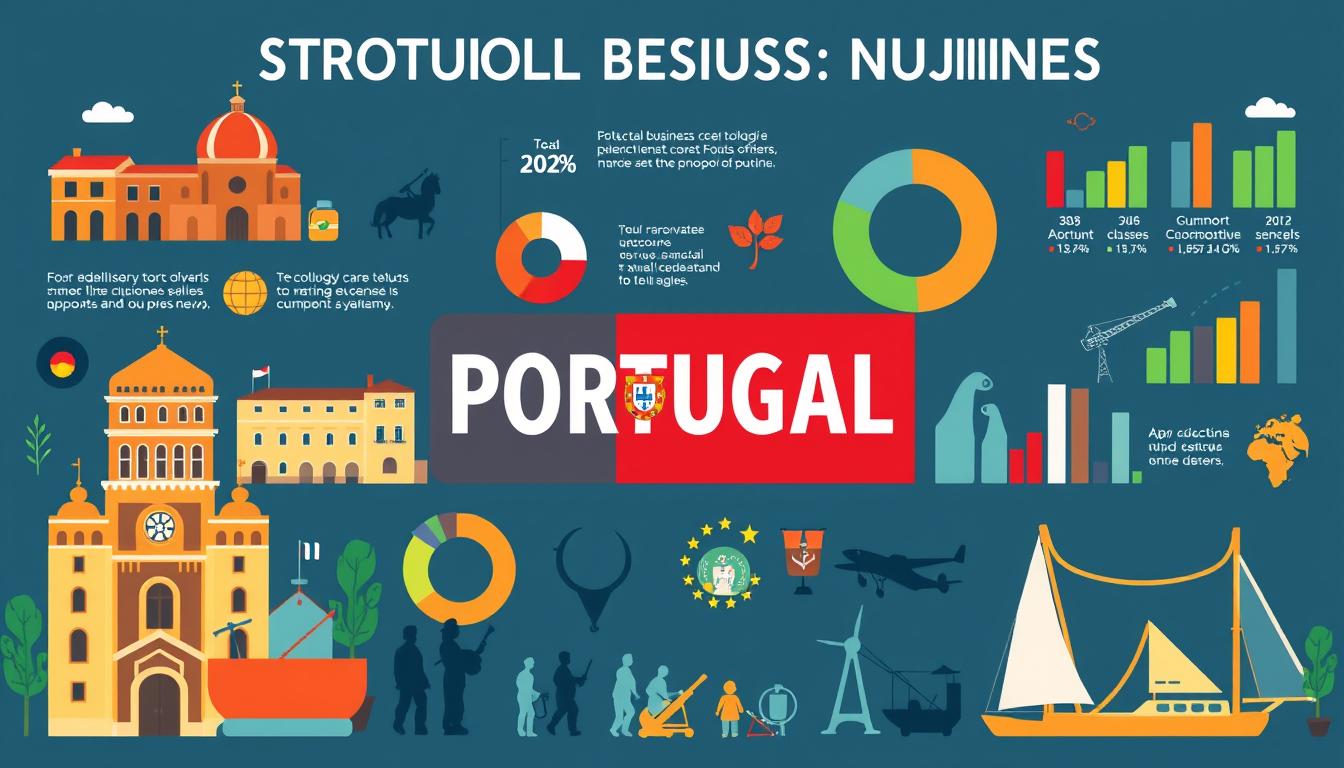Portugal
Thinking about business expansion in Europe? Portugal is a great choice, with its rich history and growing economic opportunities. It’s a stable economy with lots of room for growth, making it a top pick for global entrepreneurs.
Portugal has a high literacy rate of 96%. Almost 44% of its people aged 30-34 have a college degree. The country’s GDP is back to pre-pandemic levels, showing it’s strong and growing well. It also saw economic gains in early 2021, after COVID-19, making it a solid market.
Located in Europe, Portugal is a key entry point to the EU’s huge market of over 500 million people. It also makes it easy to reach other global markets. The government supports business innovation and offers financial help, helping companies succeed.
For those looking to grow their business internationally, Portugal is a great choice. It has a welcoming business environment, low taxes, and a growing economy. The startup scene is also thriving, making it perfect for new businesses. Companies like LerriHost are already seeing the benefits of entering the Portuguese market.
Interested in exploring more? Let’s dive into why Portugal could be the ideal place for your next business venture.
Why Portugal is the Right Choice for Expansion
Portugal is a great place for business growth. It has a strong economy, a good location, and a lively start-up scene. The country’s economy is stable and has bounced back well after the pandemic.
Economic Stability and Growth
Portugal’s economy is looking up, with a 1.7% GDP growth forecast for 2024. The government supports foreign investment and business growth. For more on Portugal’s business opportunities, check out this detailed overview.
The Golden Visa program, launched in 2012, attracts investors with a €250,000 minimum investment. It offers residency. The D2 Visa, for non-EU citizens, requires financial proof but no investment.
Strategic Location in Europe
Portugal is perfectly placed for global trade. It connects to Africa, South America, and the EU. This makes it easy to manage supply chains and reach new customers.
The Golden Visa lets investors visit Europe often without needing to live in Portugal full-time. The D2 Visa, on the other hand, requires you to stay in Portugal for at least six months a year.
Thriving Start-up Ecosystem
Portugal is known as the ‘Tech Capital of Europe’. Lisbon’s digital scene is booming, thanks to government support and a strong community. This makes Portugal a top choice for tech businesses.
Both the D2 Visa and Golden Visa allow family members to join the main applicant. This makes it easier for families to live and work together in Portugal.
Understanding the Portuguese Market
Entering the Portuguese market means knowing its varied industries and consumer habits. Portugal offers many chances in its main sectors. These are key for businesses looking to grow.
Key Industries and Sectors
Portugal’s economy is strong, with big industries like tourism, real estate, and renewable energy. The 2021 Census shows nearly 1.3 million companies, showing a lively business scene. Tourism draws millions, boosting the hospitality sector.
Real estate is also big, thanks to foreign and local investments. Portugal leads in renewable energy, attracting eco-friendly businesses. This shows the country’s commitment to sustainability.
Portugal is also a key entry point to the European Union. This makes it great for businesses wanting to grow globally. Its location offers access to markets in Europe, Africa, and the Americas.
Consumer Behaviour Insights
Knowing consumer behaviour in Portugal is key for businesses. The market is moving towards sustainable and organic products. This is seen in the food and drink sector, where people want local, organic, and fair-trade items.
The rise of e-commerce in Portugal shows a change in how people shop. More are buying online. Businesses need to focus on online sales and have a strong digital presence to meet this demand.
Portugal is also a safe and stable market. It has a low crime rate and a secure political environment. This makes it a good place for businesses and helps build consumer trust.
As we explore the Portuguese market, it’s clear that matching local tastes and using the country’s industry strengths is vital. Understanding these aspects helps us navigate the market better. It also helps us offer what Portuguese consumers want.
Legal Considerations for Business in Portugal
Expanding our business to Portugal means we need to know the legal rules. Portugal has many business types, from small to big, to suit different needs. It’s important to follow local laws and keep up with tax rules.
Business Structures Available
Portugal offers several business types:
- Sole Proprietorship: Minimum share capital of €1 (€2 for two partners)
- Individual Limited Liability Establishment: Minimum share capital of €5,000
- Private Limited Company (LDA): Minimum share capital of €5,000
- Public Limited Company (SA): Minimum share capital of €50,000
- Limited Partnership: Minimum share capital of €50,000
- LLC with Two or More Quota Holders: Minimum share capital of €2
Each type has its own rules and benefits. For example, an LDA is great for small to medium UK businesses. It’s flexible and easy to manage.
Navigating Taxes and Compliance
Understanding taxes in Portugal is key. The corporate tax rate is 21%, but SMEs pay 17% on the first €25,000. Madeira has a special tax rate of 5% until 2028, which is a big advantage.
To get these tax benefits, companies must create jobs and invest in assets. The Non-Habitual Resident programme also helps with personal taxes, making Portugal a great place for business.
But taxes aren’t the only thing to think about. VAT rates are 23%, 13%, and 6%. Social security contributions are also important, with a total rate of 34.75%.
Annual audits are required for big companies. They must also submit financial statements and tax returns on time to avoid fines.
Setting Up Your Business in Portugal
Starting a business in Portugal is a structured process. It greatly benefits from local knowledge and partnerships. Knowing the registration steps and the importance of local collaborations is key to success.
Steps to Register Your Business
- Choose a Business Structure: Pick the company type, like a Private Limited Company (Sociedade por Quotas) with a €5,000 minimum share capital or a Public Limited Company (Sociedade Anónima) needing €50,000.
- Company Name and Registration: Pick a unique name and register it with the Portuguese Commercial Registry Office.
- Online or On-the-Spot Setup: Register online (Empresa Online) or use the On-the-Spot Setup (Empresa de Hora) for quicker service.
- Commencement of Activity Statement: File this statement within 15 days of starting your company for tax reasons.
- Central Registry of Ultimate Beneficial Owners: Submit a declaration within 30 days of incorporation.
- Visa and Residency Permits: If you’re not from the EU/EFTA, get the right Portuguese visa and residency permit to start your business.
Portugal also has a Startup Visa for non-EU entrepreneurs with new, scalable business ideas. After five years, you can apply for permanent residency or citizenship.
Importance of Local Partnerships
Local partnerships are vital for setting up and running a business in Portugal. They help with the entry and operational process, which is key for service sectors. For example, LerriHost offers web hosting and WordPress services, providing essential support.
Working with local businesses helps with red tape, market understanding, and client trust. It also boosts your business’s success by using local expertise and connections. Portugal’s vibrant startup scene highlights the importance of local partnerships for growth.
Funding and Investment Opportunities
Starting a business in Portugal offers great investment chances. It’s perfect for those who want to use government help and EU funding. Portugal has grown economically a lot in the last ten years. This makes its financial scene both hopeful and competitive.
Government Support for Foreign Investors
The Portuguese government wants to draw in foreign money. It offers many incentives and grants, mainly for tech and innovation. For example, there are startup visas and tax breaks for foreign workers.
These steps are backed by Portugal’s stable politics and good financial management. Recently, S&P upgraded Portugal’s credit rating.
Foreign investors can also benefit from Portugal’s location and skilled people. The country has lots of sunshine and is safe. This makes it a great place to live and invest.
The government is serious about innovation and green growth. This makes Portugal a top player in tech and digital change in Europe.
Accessing EU Funds
EU funding can really help businesses in Portugal. It gives a lot of support for growing companies. This makes it easier for them to succeed in Portugal.
Companies like LerriHost have used these funds well. They show how EU money can help businesses grow.
Portugal is focusing on new tech and innovation. This has caught the eye of private equity and venture capital. It makes the startup scene very lively.
Living costs in Portugal are lower than in many Western European countries. This makes it a good choice for starting or expanding a business.
Investors can look into the Golden Visa. It needs a minimum of €500,000 investment. This visa helps businesses grow and also offers residency and citizenship after five years.
Finding the Right Location for Your Business
Choosing the right business locations in Portugal is key to success. Portugal has many options, from busy cities to peaceful countryside. Each place has its own benefits.
Major Cities for Business Expansion
Lisbon and Porto are great for businesses, mainly in tech and tourism. Lisbon, the capital, has a lively start-up scene. It’s supported by a government eager to help businesses grow.
Porto, with its mix of culture and modern tech, is also becoming a tech hotspot. These cities are perfect for businesses aiming to enter the European market. For example, a SaaS company aiming for 15% of its revenue from Europe in 18 months will find these cities ideal.
There are many funding and networking chances in these cities. These can help businesses grow by 2025, in areas like AI, sustainable farming, and digital marketing.
Benefits of Rural versus Urban Settings
Rural areas in Portugal are peaceful and cheaper to run a business. They’re great for sustainable farming or eco-tourism. Living and running costs are much lower than in cities.
When picking a location in Portugal, weigh the pros of cities and countryside. Cities offer modern facilities and networking chances. Countryside areas are peaceful and cost-effective, perfect for certain businesses. Choose the place that fits your business needs and goals.
In short, Portugal’s varied landscape meets many business needs. Whether in cities or countryside, each location has its benefits. The right spot depends on your business type and goals.
Navigating the Portuguese Language and Culture
To grow your business in Portugal, you need more than just a plan. You must understand the local culture and language. Knowing the importance of Portuguese and adapting to the culture can make a big difference.
Importance of Language Proficiency
Speaking the language well is key to communicating and fitting in. It builds trust and credibility with locals and business partners. While many in big cities and international firms speak English, trying to speak Portuguese can really help.
Companies like McDonald’s show how important it is to adapt to local tastes. This shows how language skills are vital.
Understanding Cultural Differences
Knowing the local culture is essential in Portugal. The culture values respect, formality, and personal relationships. Being aware of these helps you navigate the business world better.
Portuguese people value punctuality, showing a structured approach. Starting with small talk before business talks is also important. Companies that research the culture before entering the market do better, like Coca-Cola in China.
Grasping cultural differences can lead to success in Portugal. Companies that understand the local work culture, with its siestas and socialising, build strong relationships. This is key to business success.
Hiring in Portugal: The Employment Landscape
Portugal has a skilled workforce with high educational levels. Its labour laws balance employee protection and employer flexibility. This makes it great for setting up a local business.
Labour Market Overview
Portugal values decent wages and working conditions. The minimum wage is €870 a month, with higher rates in Madeira and the Azores. The government plans to increase this to €1,020 by 2028.
Employers pay an extra 26.5% of the salary, while employees contribute about 11%. Both enjoy a social security system. Workers have 8-hour days and 40-hour weeks, with strict overtime rules.
Employment Laws and Regulations
Portuguese laws give workers many benefits, like annual leave and family support. Full-time workers get 22 days off each year. Overtime is paid at higher rates, depending on when and how long it is worked.
Maternity leave is 120 days at full pay, if the employee has worked recently. Paternity leave is 28 days, with 7 days after the birth compulsory. Employees also get paid leave for marriage and urgent child care.
The employment laws in Portugal protect workers well but also help businesses run smoothly. This balance supports business growth and keeps employees happy.
Marketing Your Business in Portugal
Marketing in Portugal needs a deep understanding of local habits and media use. With a literacy rate of 96% and many educated people, the audience is ready for modern marketing. This makes Portugal a great place for businesses to grow.
Effective Advertising Strategies
Effective ads in Portugal use both old and new media. The country’s strong economy and quick recovery offer a chance to thrive. It’s key to use content that fits the culture and to pick media that locals love, like TV, radio, and online ads.
Also, don’t miss out on national holidays and big events for special campaigns. With 22 days off a year, timing your ads right can really boost engagement.
Utilising Digital Marketing
Digital marketing in Portugal is very effective because of high internet use and social media activity. SEO, PPC, and content marketing help businesses reach the right people and see real results.
At places like LerriHost, SEO is a big part of digital marketing. It helps businesses show up high in search results, which is vital in a competitive market. The startup scene in Portugal, with over 2,000 new startups in five years, shows the chance for innovation in digital marketing.
Using social media, email, and working with influencers are also smart moves. A strong online presence helps reach more people and build trust in the Portuguese market.
Building a Local Network in Portugal
Creating a strong local network in Portugal is key for business success. Joining business associations and attending networking events helps us understand market trends. It also helps us build a good reputation.
The Role of Business Associations
Business associations are very important for navigating the local market. They offer resources, guidance, and a chance to meet other professionals. For example, the Portuguese Chamber of Commerce and Industry has seminars and workshops for newcomers.
Being part of these networks opens up new business chances and partnerships. It helps us in our networking journey in Portugal.
Attending Networking Events
Networking events are great for making connections and learning about the local business scene. Meetup hosts many events for different interests. For example, Lisbon Coders and Beta-i Innovation Hub are good places to meet tech fans and experts.
Startup Lisboa and SAPO Codebits also offer chances to network. Using LinkedIn to join Portuguese tech groups and taking courses at Le Wagon Lisbon can improve our skills and networking. By going to these events regularly, we can grow our presence and make important professional connections.
Challenges to Consider When Expanding
Portugal is a great place for business growth, thanks to its location and government support. Yet, there are risks to consider. This part talks about these risks and how to handle them, as well as common mistakes in the Portuguese market.
Potential Risks and How to Manage Them
One big risk in Portugal is dealing with the red tape. The local rules can be complex and slow, which can cost time and money. To avoid this, plan for extra time and think about getting local experts to help.
Another risk is the strong competition. In areas like tourism and tech, the market is fierce. To stand out, do deep market research and understand what locals want. This blog on doing business in Portugal can give you useful tips.
Financial risks are also big. Changes in currency can affect prices, so plan for these changes. Also, getting political risk insurance can protect you from unexpected political issues.
Common Pitfalls in the Portuguese Market
When expanding to Portugal, some common mistakes happen. One is not valuing local partnerships enough. Working with local businesses, from lawyers to suppliers, is key. They can help you understand the market better.
Another challenge is dealing with taxes and rules. The tax laws in Portugal are complex and vary by region. Knowing these rules well is important to avoid legal trouble. Getting help from local tax experts can make this easier.
Language barriers are also a big issue. Even though many speak English, knowing Portuguese can help a lot. Many companies use language services to improve their relationships with locals. With a 30% rise in language schools and translation services, this is a smart move.
Case Studies: Successful Expansions into Portugal
Looking at how international businesses have grown in Portugal is very enlightening. We learn a lot by studying their strategies. This helps us understand how to succeed in the Portuguese market. Here, we share some key examples and lessons from these businesses.
Examples of International Businesses Flourishing
Embraer, a Brazilian aerospace company, is a great example. It invested in OGMA, a leading Portuguese aviation firm. This partnership has boosted Embraer’s European presence and brought new technology to Portugal’s aviation sector.
Brazilian investments in Portugal have been impressive. From 2015 to 2021, they totalled around 176 million euros. This is about 4% of Portugal’s foreign investments. The tourism sector has also grown, with Lisbon and Porto becoming major tourist spots.
Lessons Learned from Their Experiences
There are important lessons from businesses that have thrived in Portugal. Understanding local laws is key. Portugal has made it easier to enter the market, but there are challenges in licensing and permits. Forming local partnerships, like Embraer did with OGMA, helps overcome these hurdles.
Being flexible is also vital. Portugal’s tax laws change often, affecting businesses. Adapting quickly to these changes is a lesson learned. Also, sectors like renewable energy and technology are attracting more investment.
Improving the regulatory environment could attract even more investment. Studies show that making it easier to do business in services and digital trade could bring in billions. Working together, AICEP and international businesses aim to make Portugal a top choice for investment.
Conclusion: Taking the First Steps to Expand
As we wrap up our guide on expanding your business to Portugal, remember the key role of preparation. Starting this journey is more than spotting opportunities. You need a deep market analysis, solid strategic plans, and a clear understanding of your expansion readiness. These are vital for a smooth transition into Portugal’s business scene.
Evaluating Readiness for Expansion
First, check if your company is ready to grow. Look at your resources, financial health, and market demand. This step is critical to ensure you can thrive in a new place. Getting advice from local experts can be very helpful during this time.
Final Thoughts on Making the Move
Portugal is a great choice for business growth, with its stable economy and tax benefits. We’ve shown that careful planning and using local resources are key. By doing this, your business can not only succeed but also help the local economy. Starting with a solid plan will set your business up for success in Portugal.

Pros and Cons of Expanding Your Business to Portugal
Discover the benefits and drawbacks of taking your enterprise to new heights by exploring the pros and cons of expanding your business to Portugal.

Structural business statistics in Portugal
In today’s fast-changing economy, knowing about structural business statistics in Portugal is key. These stats give us vital data to ...

Starting a Business in Portugal: Branch or Subsidiary?
Starting a business in Portugal is an exciting chance for UK entrepreneurs to grow. They want to bring their businesses ...

Relocating to Portugal for business
Discover the essentials of relocating to Portugal for business, from Lisbon's dynamic market to the Algarve's opportunities.

Best Business Startups in Portugal 2025
Unlock lucrative opportunities with our guide on top business ideas to start in Portugal – your portal to success in 2025's vibrant market.

Navigating Business Banking in Portugal for UK Firms
Discover key insights for UK companies on navigating the nuances of Business Banking in Portugal with expert guidance and strategic tips.

Navigating Business Culture in Portugal | Insights
Explore the nuances of business culture in Portugal with our expert insights and guide your cross-cultural ventures to success.

Doing Business in Portugal: A Friendly Guide
Venture into the Portuguese market with ease. Our guide covers essential tips for doing business in Portugal, from legalities to cultural insights.
Are you planning to Start a business in Portugal? Is it better a Branch or Subsidiary for Portugal?








